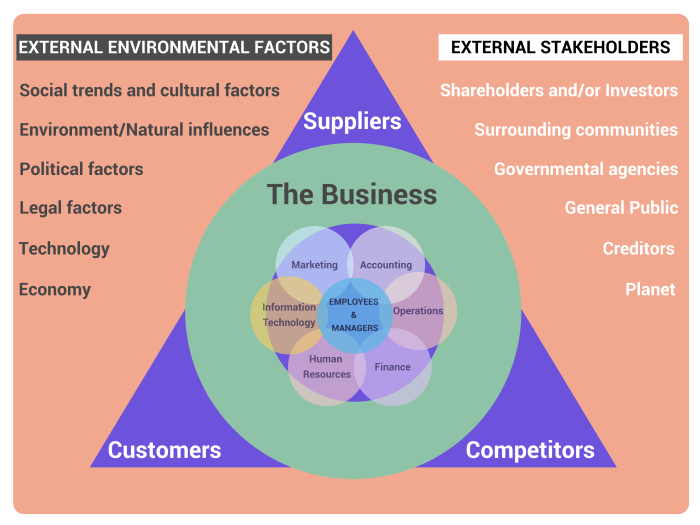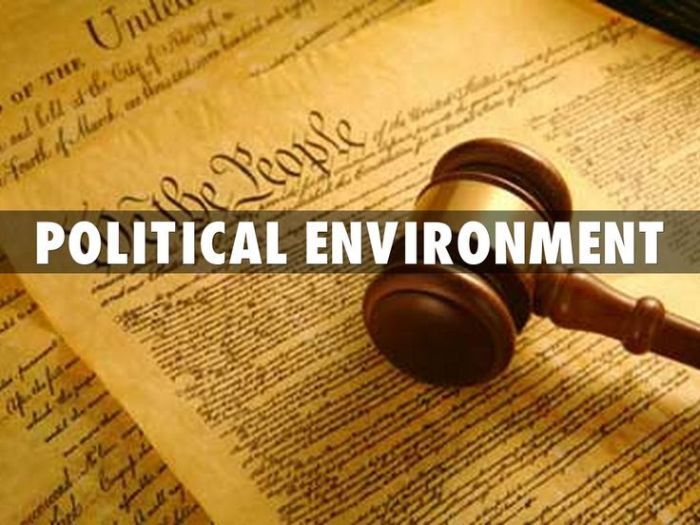With Political influence on business environment at the forefront, get ready to explore how the decisions made in the political arena shape the way businesses operate, thrive, or struggle in the ever-changing landscape of commerce. From regulations to lobbying, this journey promises to unravel the intriguing dynamics at play.
As we delve deeper into the impact of political decisions on businesses, you’ll discover a world where power, profit, and influence collide to create a unique ecosystem that drives economies and shapes industries.
Political Influence on Business Environment

Political decisions have a significant impact on the business environment, shaping regulations, policies, and overall market conditions. Changes in government leadership can introduce new laws or amend existing ones, influencing how businesses operate and make decisions. Lobbying and political connections also play a crucial role in shaping the business landscape, as organizations seek to advocate for their interests and gain a competitive edge.
Regulations and Policies
Government regulations and policies can directly affect business operations by imposing restrictions, setting standards, or providing incentives. For example, environmental regulations may require companies to adopt sustainable practices, impacting their production processes and costs. Tax policies can also influence investment decisions, with changes in tax rates affecting profitability and strategic planning.
Government Leadership Changes
When there is a change in government leadership, businesses may face uncertainty as new policies are introduced or existing ones are revised. For instance, a shift towards protectionist trade policies can disrupt global supply chains and impact international businesses. Conversely, pro-business initiatives can create opportunities for growth and innovation, stimulating economic activity.
Lobbying and Political Connections
Lobbying efforts and political connections can shape the business environment by influencing decision-making processes and regulatory outcomes. Companies engage in lobbying activities to advocate for favorable policies, gain access to policymakers, and protect their interests. Political connections can provide businesses with insider knowledge and opportunities to influence policy discussions, giving them a competitive advantage in the market.
Business Environment

The business environment refers to the external factors that can influence the operations and success of a business. These factors can include economic conditions, technological advancements, political regulations, social trends, and environmental issues.
Key Elements of Business Environment
- Economic Factors: Economic conditions such as inflation, unemployment, interest rates, and GDP growth can have a significant impact on businesses. For example, a recession can lead to decreased consumer spending, affecting businesses across various industries.
- Technological Advancements: The rapid pace of technological innovation can create opportunities for businesses to improve efficiency, reduce costs, and reach new markets. Companies that fail to adapt to technological changes risk falling behind their competitors.
- Political Regulations: Government policies and regulations can shape the business environment by imposing restrictions on certain industries, promoting sustainability initiatives, or providing incentives for investment. Businesses must comply with these regulations to avoid legal repercussions.
- Social Trends: Changing social attitudes and behaviors, such as preferences for sustainable products or ethical business practices, can influence consumer demand and market trends. Companies that align with these social trends can enhance their brand reputation and attract more customers.
- Environmental Issues: Increasing awareness of environmental issues such as climate change and pollution has led to a growing emphasis on sustainability and corporate social responsibility. Businesses that prioritize environmental sustainability can enhance their reputation and appeal to environmentally conscious consumers.
Impact of Economic Factors on Business Environment
Economic factors play a crucial role in shaping the business environment. Fluctuations in economic conditions can impact consumer purchasing power, market demand, production costs, and overall business performance. For example, during a period of economic growth, businesses may experience increased demand for their products and services, leading to higher revenues and expansion opportunities. Conversely, during an economic downturn, businesses may struggle with declining sales, reduced profitability, and potential layoffs.
Technological Advancements in Business Landscape
Technological advancements have transformed the business landscape by enabling automation, data analytics, e-commerce, and digital marketing. Businesses that leverage technology effectively can streamline operations, improve decision-making processes, and enhance customer experiences. For example, companies that adopt cloud computing solutions can benefit from increased flexibility, scalability, and cost savings compared to traditional IT infrastructure. Embracing technological advancements is essential for businesses to stay competitive and adapt to rapidly evolving market trends.
Final Summary
In a nutshell, Political influence on business environment sheds light on the intricate dance between governments and corporations, showcasing how policies, regulations, and leadership changes can either spark innovation or hinder progress in the business realm. Dive in, and unravel the complexities that define this symbiotic relationship.
Questions Often Asked
How do political decisions impact the business environment?
Political decisions can create regulations that either facilitate or impede business operations, influencing market dynamics and industry growth.
What role does lobbying play in shaping the business environment?
Lobbying can sway policymakers to create laws or regulations that benefit specific industries or corporations, altering the business landscape significantly.
How do changes in government leadership affect businesses?
Changes in government leadership can lead to shifts in policies, priorities, and regulations, impacting how businesses strategize and adapt to new challenges.
What are the key elements within the business environment?
The business environment comprises factors such as economic conditions, technological advancements, market competition, regulatory frameworks, and consumer behavior.
How do technological advancements influence the business landscape?
Technological advancements can disrupt industries, create new market opportunities, streamline operations, and drive innovation within businesses, reshaping how they operate and compete.